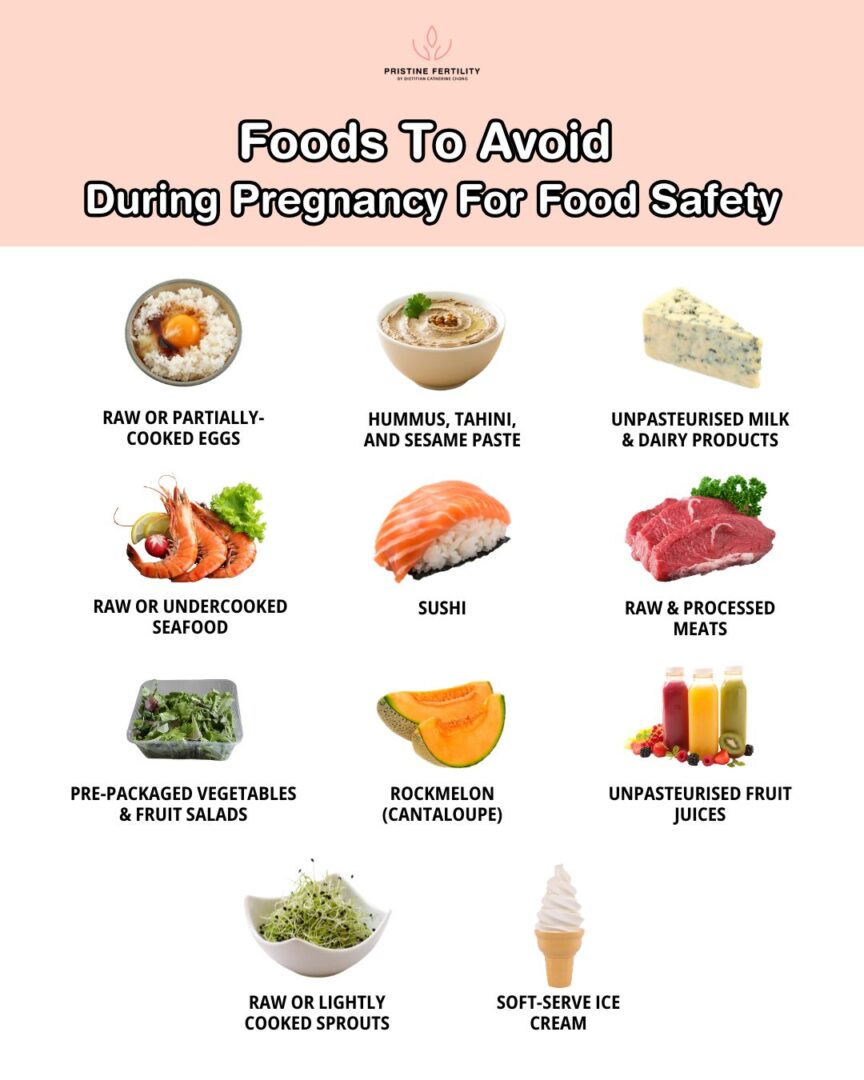Why Knowing Which Foods to Avoid During Pregnancy Matters
If you’re in the two-week wait and hoping for a positive pregnancy test soon, now is the time to start thinking about which foods to avoid during pregnancy. Since many women don’t realise they’re pregnant until a few weeks in, early dietary choices can impact your baby’s development right from the start.
Listeriosis is a serious bacterial infection that, while rare, can have devastating consequences during pregnancy, including miscarriage, stillbirth, or severe illness in newborns. Pregnant women are more susceptible due to hormonal changes that weaken the immune system, making it harder to fight off infections.
In Australia, about 65 cases of listeriosis are reported annually, with 1 in 5 cases (20%) in pregnant women leading to fetal loss. The risk of infection seems to be most significant in the third trimester (Queensland Health, 2023).
This blog will help you understand the risks of foodborne illnesses and empower you to make informed dietary choices to support a safe and healthy pregnancy.
What Are Listeria & Salmonella?
Listeria is commonly found in soil, water, and contaminated food. While healthy adults may only experience mild symptoms, invasive listeriosis can cause severe complications in those who are pregnant. Symptoms may include:
- Fever
- Headache
- Fatigue
- Muscle aches and joint pain
- Nausea and vomiting
- Diarrhea
- Neck stiffness
(NSW Government Food Authority, 2014).
Symptoms can appear within 24 hours of consuming contaminated food but may take up to two months to develop. If you experience any of these symptoms or suspect you’ve been exposed to high-risk foods, consult a medical doctor immediately.
Another foodborne threat is Salmonella, one of the most commonly reported bacteria responsible for food poisoning. Pregnant women are at higher risk of severe illness from Salmonella, which has been linked to outbreaks associated with raw or lightly cooked eggs and egg-based products (Queensland Health, 2021).
The good news is you can take proactive steps toward a healthier pregnancy by understanding which foods to avoid.
If you’re currently trying to conceive, visit our previous blog post here to learn more about five evidence-based tips to boost fertility naturally.
Foods to Avoid During Pregnancy

1. Raw or Partially-cooked Eggs
- Avoid foods containing raw or soft-boiled eggs, such as homemade mayonnaise, aioli, chocolate mousse, Japanese ramen/udon noodles, and Caesar salads.
- Do not taste uncooked cake or pancake batter containing raw eggs.
2. Hummus, Tahini, and Sesame Paste
- Tahini, hummus, and other sesame-based products can be at risk for Salmonella contamination. While sesame seeds are typically roasted to kill bacteria, the process may not always be thorough enough to eliminate all Salmonella, mainly if contamination occurs during harvesting or processing.
- Additionally, due to their low moisture content, these products can allow bacteria to survive for long periods, even after roasting.
3. Unpasteurised Milk & Dairy Products
- Avoid unpasteurised milk.
- Avoid soft and semi-soft cheeses, such as brie, camembert, ricotta, fetta, blue, etc., unless they have been cooked to at least 75 °C and consumed immediately.
- Avoid soft-serve or fried ice cream due to contamination risks.
4. Raw or Undercooked Seafood
- Avoid raw or ready-to-eat chilled peeled prawns.
- All fish and seafood must be cooked thoroughly and eaten while hot.
- Store leftovers in the fridge, reheat to at least 60°C, and consume within a day.
5. Sushi
- Store-bought sushi should be avoided unless made at home with freshly cooked ingredients.
6. Raw & Processed Meats
- Avoid any raw meat or poultry.
- Do not eat ham, salami, luncheon meat, or chicken deli meat unless it is fully cooked to at least 75°C and consumed immediately.
- This also includes cold chicken or turkey from sandwich bars.
7. Pre-Packaged Vegetables & Fruit Salads
- Pre-packaged salads and cut fruits carry a higher risk of Listeria due to extended shelf life and handling processes.
- Wash home-prepared salad ingredients thoroughly just before preparation. Store any leftovers in the fridge and consume within a day.
8. Rockmelon (Cantaloupe)
- Rockmelon has been linked to foodborne in the past.
- Current guidelines in Australia recommend avoiding it during pregnancy due to the contamination risk.
9. Unpasteurised Fruit Juices
- Avoid freshly squeezed juices from cafes, farmers’ markets, or juice bars, as pre-cut fruit and juicing machines may harbor bacteria.
- Opt for pasteurised juices instead.
- If making fresh juice or smoothies at home, thoroughly wash all fruits under running water before use.
10. Raw or Lightly Cooked Sprouts
- Avoid raw sprouts, including alfalfa, broccoli, onion, sunflower, clover, radish, snow pea, mung bean, and soybean sprouts, unless thoroughly cooked.
The Bottom Line
Avoiding these high-risk foods can help to minimise the risk of foodborne illness and create a safe and nourishing environment during pregnancy.
More Resources:
